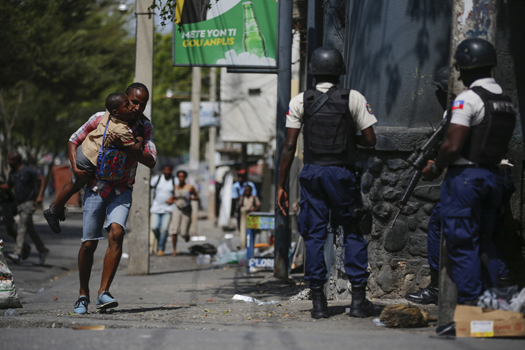International cooperation projects
Université Laval plays an active role in international cooperation by developing intervention, research, and training projects and providing technical assistance to other countries for the transfer and exchange of knowledge and services.
Today, the world faces multiple challenges, including security threats, the effects of global warming and climate change, migratory movements, communicable disease pandemics, persistent extreme poverty, and growing inequalities.
Université Laval plays a strong leadership role in sustainable development, and through its efforts, it has been able to establish promising relationships and partnerships with the community.
Project financing
International cooperation projects often receive public or private financial support, but also benefit from official development assistance funding from various organizations, multilateral development banks, and development aid agencies, or directly from the countries and institutions supported.
Current projects
Université Laval has a number of major cooperation projects underway, most of them in partnership with recognized nongovernmental organizations in Canada and abroad. Drawing on ULaval resources and expertise, these projects are an opportunity to forge strong ties with our partners, share our knowledge and skills, and play a role in training participating students.

Projet d’appui à des services de santé adaptés au genre et équitables (PASSAGE)
Home faculty: Medicine
Partners: Éducation internationale, Fédération des cégeps, Réseau francophone international pour la promotion de la santé, Collaboration santé internationale, Association ivoirienne pour le bien-être familial, Association ivoirienne des professionnels de la santé publique, and the Youth Mission for Education, Health, Solidarity and Inclusion (MESSI)
Professor in charge: Maman Joyce Dogba
PASSAGE is an initiative that takes a holistic approach to promoting health and aims to bring together players in education, healthcare, and civil society to promote sexual and reproductive health and rights for teenage girls and young women in the Haut-Sassandra region of Côte d’Ivoire.

Projet d’appui à la santé sexuelle et reproductive pour elles (PASSERELLE)
Home faculty: Education
Partners: World University Service of Canada, Farm Radio International, and the government of Côte d’Ivoire
Professor in charge: Jean Ramdé
Funded by: Global Affairs Canada
The Projet d’appui à la santé sexuelle et reproductive pour elles in Côte d’Ivoire is a 5-year initiative (2022–2027) that will reduce the social, cultural, and structural barriers limiting access and informed decision-making about individual health choices and sexual and reproductive rights for diverse groups of vulnerable and marginalized teenage girls in the Bas-Sassandra district of Côte d’Ivoire.

Perspectives on insecurity in Haiti
Home Faculty: Social Sciences
Partners: Open Society Foundations, Fokal
Professor in charge: Yanick Charette
Consultant: Roberson Edouard
Manager: Tomas Salcedo Albert
Haiti is currently in the throes of one of the worst crises in its history. The past decade has been marked by political instability and a security crisis that have paralyzed the country, caused parliament to malfunction, and hampered the economy, while fuelling an epidemic of armed violence and illegal armed groups.
Université Laval convenes North and Latin American expertise and Caribbean knowledge to discuss ways to deal with levels of armed violence as high as those in Haiti today.
Past projects
AKOSAA project: Improving food security and promoting public health in Haiti
Home faculty: Agricultural and Food Sciences (FSAA)
Faculties involved: Medicine, Arts and Human Sciences, Business Administration
Canadian partners: Centre de coopération internationale en santé et développement, SOCODEVI, University of Moncton
Funding partner: Global Affairs Canada
Professor in charge: Patrice Dion
The AKOSAA project aims to increase access to sufficient, safe, and nutritious food and improve the health of 8,000 people in the commune of Saint-Marc, in Haiti’s Artibonite region by intensifying and diversifying agricultural production, promoting public health, and encouraging producers to adopt agricultural practices better suited to ecological principles and nutritional needs. The project also aims to strengthen the teaching and applied research capabilities of the State University of Haiti by establishing a sustainable partnership between the university, public health organizations, and the local community. The initiative is designed to help 16,000 people improve their understanding of nutritional health, and increase the incomes of 2,600 women in Saint-Marc.
- Sécurité alimentaire en Haïti, ULaval nouvelles
- Haïti: une aide internationale positive, ULaval nouvelles
- Pour la sécurité alimentaire d’Haïti: Production de semences de sorgho résistant, ULaval nouvelles
AFLAH Project: Stepping up the fight to control aflatoxins in Haiti
Home faculty: Agricultural and Food Sciences (FSAA)
Partners: Meds & Food for Kids, Ifoundation, Chibas Foundation , Haiti Bureau of Standards
Funding partner: International Development Research Centre (IDRC)
Professor in charge: Patrice Dion
In Haiti, a high percentage of the population is exposed to aflatoxins—poisonous and cancer-causing chemicals growing in soil, decaying vegetation, hay, and grains. These substances are regularly found among staple food commodities and enter the food supply when processed. Children are particularly affected by aflatoxin exposure, which leads to stunted growth, delayed development, and liver-related diseases. The AFLAH project aims to get Haitians involved in the fight to control aflatoxins. Working from the principle that the methods for limiting food contamination are already well known, the project focuses on factors that influences use of these methods by producers, distributors, and processors of peanuts, sorghum, and corn-based foods.
FOGRN-PEFOGRN: Forest resource management training in the Congo Basin
Home faculty: Forestry, Geography and Geomatics
Canadian partner: Centre d'enseignement et de recherche en foresterie de Sainte-Foy (CERFO)
Professor in charge: Damase Khasa
Funding partner: Global Affairs Canada, Congo Basin Forest Fund (African Development Bank)
The FOGRN-PEFOGRN project aims to strengthen the institutional and technical capacities of training institutions (universities and colleges) in three Central African countries so they can become regional centres of excellence in sustainable management of natural resources. Natural resources constitute an important source of revenue for most states in Central Africa and are critical for local populations that depend on them for their livelihood. To ensure sustainable resource management, governments, private sector companies, and NGOs require specific competencies that are currently lacking in the region, especially in the Democratic Republic of Congo (DRC). This project aims to help fill the gap by emphasizing South-South cooperation and strengthening forestry training.
FASAM project: Training for food security in Mali
Home faculty: Agricultural and Food Sciences (FSAA)
Partners: Collège Boréal and Éducation Internationale
Manager in charge: Daniel Campeau
The FASAM project aims to improve the availability of agricultural training, develop a skilled workforce, and foster job creation for young people. Agriculture is the pillar of the Malian economy, yet food insecurity, caused by a mix of external and structural factors, remains a constant concern. Development of a skilled agricultural workforce can play a key role in preventing food crises and achieving sustainable food security. The project supports six Malian institutions that provide vocational, technical, and university training.
PASME projects: Improving maternal and child health in Burkina Faso
Home unit: International Office
Faculties involved: Medicine, Pharmacy, Business Administration, Education, Nursing
Organization responsible for the project: World University Service of Canada
Canadian partner: Farm Radio International
Funding partner: Global Affairs Canada
Project manager: Joanie Dionne-Rhéaume
The second phase of the PASME project has been underway since June 2016 in the eastern, northern, and central western regions of Burkina Faso. In collaboration with local authorities and selected communities, PASME 2 aims to reduce maternal and infant mortality using a continuum of care approach. The program, part of an intervention strategy based on fostering social consensus and bringing about changes in behaviour, has two main thrusts: improving the availability and delivery of maternal, newborn, and child health services (MNCH) and getting women and their children to use these services more.
The following documents are available in French only :
- Fiche projet (PDF)
- Fiche synthèse - approche centrée sur la personne (PDF)
- Fiche synthèse - communauté virtuelle de pratiques (PDF)
- Fiche synthèse - pratique des ASBC (PDF)
- Fiche synthèse - implication des hommes (PDF)
- Fiche synthèse - évaluation des stages (PDF)
- Fiche synthèse - implication de l'Université Laval (PDF)
- Fiche synthèse - parcours de soins (PDF)
- Infographie résultats finaux PASME (PDF)
- «Agir pour la vie» (video)
- «Chaque vie compte» (video)
You can also watch our PASME 2 videos on the International Office Youtube page. (in French only)
- Pour la santé durable des Burkinabés, ULaval nouvelles
Partnership in action: universities and local communities developing climate-resilient agroforestry systems in Cameroon (PADESAR3C)
Home Faculty: Forestry, Geography and Geomatics (FFGG)
Partners: ABIOGeT, Université de Dschang
Funding Partner: Québec Green Fund, Ministère de l’Environnement et de la Lutte contre les changements climatiques (MELCC)
Professor in charge: Damase Khasa
The project focuses on local capacity building to develop agroforestry systems that are more resilient to climate change in two particularly vulnerable agro-ecological zones in Cameroon: the (i) Sudano-Sahel (Northern Cameroon) and the (ii) High Guinea Savannah (Adamaoua). Université Laval and its partners are working to boost the capacity of farmers in Cameroon through training and technical support on the ground.
Research is also underway on carbon sequestration through sustainable management of agroforestry systems with a view to reducing greenhouse gas emissions. Université Laval is conducting the project with financial support from the Government of Québec via Ministère de l’environnement et de la lutte contre les changements climatiques (MELCC) as part of the 2013‒2020 Action Plan on Climate Change, funded by the Green Fund.
The following documents are available in French only:
Project poster
Appendix 8: Problématique de la dégradation des terres et des paysages dans les zones arides et semi-arides du Cameroun
Appendix 9: L’agroforesterie comme outil de lutte contre les Changements Climatiques et pour la restauration des terres et des paysages dégradés dans les régions arides et semi-arides du Cameroun (Zones agro-écologiques soudano-sahélienne et soudano-guinéenne)
Appendix 10: Barrons la route à la propagation Covid-19 en tout temps
- On November 27 and 28, 2018, Professor Damase Khasa presented the project to the scientific and academic college of the Congo Basin Forest Partnership at the 18th Meeting of the Parties of the Congo Basin Forest Partnership in Brussels, as well as to the General Delegation of Québec in Brussels (meeting with the Delegate General Michel Audet, Director of Bilateral and Public Affairs Grégoire Diamant, and Stéphanie Roy). A poster promoting the project to the general public was also presented.
- The official launch of the PADESAR3C project took place in Yaoundé on March 13, 2019, attended by approximately forty representatives of a range of organizations. See the article on the subject published in Villes et Communes.
- The PADESAR3C project was presented to a workshop on scientific advice to governments organized by Québec’s Chief Scientist’s Office and the Cameroon Academy of Young Scientists (Appendix 11).
- The PADESAR3C project was presented at the first international conference organized by the Cameroon Academy of Young Scientists.
Contact
Tomás Salcedo-Albert
Advisor on International Cooperation and Partnerships
cooperationinternationale@monde.ulaval.ca